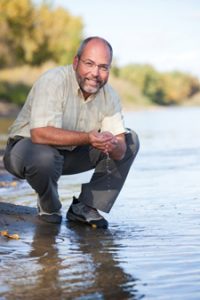Mountain water serving half the world is disappearing. Canadian scientist Dr. John Pomeroy reports back from the “High Mountain Summit” in Geneva. From Queensland Australia, Sean Maxwell explains intact tropical forests count for 6 times more carbon than thought. Those distant places may determine how hot, stormy, or flooded your future may be.
I’m Alex Smith. This is the world-wide broadcast of Radio Ecoshock.
Listen to or download this episode of Radio Ecoshock in CD Quality (57 MB) or Lo-Fi (14 MB)
As world media shows us the great city of Venice going underwater, I recommend you go back to our recent broadcast about Venice in rising seas, with our Italian guest Luca Muscara. He said this would happen and why. That program is available free. While you are here, check out fire expert Greg Mullins with the true story of the current extreme fire danger for Australia. Earlier this week Sydney was under hazardous smoke warning, and NASA images show Eastern Australia buried in smoke. It’s still just the start of fire season there. We told you…
===========================================================================================
GLOBAL WATER FUTURES – JOHN POMEROY
Who cares about water? Everyone and every living thing. But the general path of water falling and stored on the high places, then flowing down to us, has been thrown off by changes in the climate. About half the world’s population, including many of us in the “developed” world, are in for a shock. Behind the scenes, experts are meeting to assess the grave risk.
This Reuters headline from October 29 says it well: World Unprepared for Impact of Climate Change on Mountain Water Supplies-Experts
World experts just gathered in Geneva at the “High Mountain Summit“. The problem: up to half of the world’s people get their water from mountains – but that is threatened by a changing climate. Dr. John Pomeroy is a Canadian expert on hydrology and co-chair of that Summit. Pomeroy is Director of Global Water Futures, and leads many other institutions, including as Canada Research Chair in Water Resources and Climate Change. We reached John at his home University of Saskatchewan in Canada.

DR JOHN POMEROY
David Stobbe / Stobbe Photography
Listen to or download this 28 minute Radio Ecoshock interview with John Pomeroy in CD Quality or Lo-Fi
In 2013 I went to visit family in Calgary Canada. Large parts of the city had just flooded. It was epic. Calgary is one of countless case studies where we are only just discovering how mountain water systems work. Now we have to add uncertainty due to climate change.
In many other places, mountain water supplies are dwindling. Some cities in South America and Asia need to worry now. In America, water for desert cities like Phoenix and Las Vegas come from the mountains, not to mention water for California’s important crops. Can we count on it?
It is so difficult to see what will happen with things like snow pack in the mountains. On the one hand large parts of the Earth will get dryer, but the atmosphere overall will get wetter. Then we have extreme precipitation events popping up, whether that falls as rain or snow.
I have seen several news stories, even this fall, of glaciers about to burst, or floods coming out of the mountains – in the Alps of Switzerland and Italy. We discuss that.
John Pomeroy produced so much in his career. I developed a short-list of important topics – that need half an hour each! For example, snow contaminants. The expression “pure as the driven snow” doesn’t sound so true now that we are filling the sky with toxic materials. John talks about measuring snow blowing across Scotland – so acidic from Eastern European pollution that it burns the skin! John Pomeroy published about the snow contamination problem in April of 2019. And now with global warming, toxic materials are being released by melting glaciers!
We could talk about snow cover depletion. This become a problem for farmers in the Canadian province of Saskatchewan. Weird water patters are already affecting the wheat crop that Canada exports to help feed a hungry world. This past summer there was a mini-drought, but it looked like the crop could be salvaged. Then incessant and unusual fall rains kept farmers out of the fields. We have yet to tally the losses. Climate change altered snow cover – and the major rivers that flow all the way from the Rocky Mountains to the plains of Canada and the United States.
Maybe we should set up another interview to cover another co-authored paper, this time published in 2018: “Recent Changes to the Hydrological Cycle of an Arctic basin at the Tundra-Taiga Transition“. The authors are talking about a giant band of territory around the Earth that most of us have never seen or even heard about. But that is part of John’s life specialty: “cold-water hydrology”.
It was a pleasure to talk with a master in this little-known but critical field, emerging from the University of Saskatchewan but now in demand all over the world.
===================================================================================
CARBON COSTS OF LOST TROPICAL FOREST GROSSLY UNDERESTIMATED – SEAN MAXWELL
I’m not going to lie to you. Trying to sell “tropical forests must be saved” isn’t easy these days. Perhaps issue fatigue has set in. But new research shows intact forest loss IS a critical factor for whether we win or lose the climate fight.
When forests are logged or burned – carbon floods into the atmosphere. But that is not the end of it. The loss continues for decades as a significant factor in climate change. In fact, a new paper from a young Australian scientist says experts and planners underestimate the true costs of hacking into tropical rainforests by a stunning 626 percent. The damage to the atmosphere is six times greater than previously thought.
The new paper in the prestigious journal Science Advances was published October 30, 2019. We reached the lead author Dr. Sean L. Maxwell at the University of Queensland in Australia. Sean published important work while still an undergraduate, holds a Diploma in Yoga Education from India, and speaks passably the Indonesian language of Bahasa. You can follow Sean work at greenfirescience.com.

Dr. Sean Maxwell, University of Queensland
Sean’s latest publication, just out at the end of October, is “Degradation and forgone removals increase the carbon impact of intact forest loss by 626%“.
Listen to or download this 29 minute Radio Ecoshock interview with Sean Maxwell in CD Quality or Lo-Fi
We reached Sean in Vienna. For me, Sean bounced into public view with his 2016 article also published in Nature: “Guns, nets and bulldozers driving species loss“. He argued climate change isn’t killing species: we do most of it the old-fashioned way: with hunting, logging, and burning out forests for more agriculture.
Sean talks to us about the old and new vision of tropical forests and climate. One key phrase from this new paper: Sean Maxwell bring us up to speed on “forgone carbon sequestration” – what it means and why it matters.
Suppose you had $10,000 in the bank, earning interest. Then you blow that on something else, like in a casino loss. Not only have you lost $10,000 – but you lose all the interest you might have earned for many years. It’s like that, only worse, when we demolish an intact tropical forest. Not only is all the carbon from tree trunks and forest floor let loose into the atmosphere – that living forest can never capture as much carbon again as it used to do every year, over decades and centuries. Institutions like the Intergovernmental Panel on Climate Change, and climate models, neglected that secondary loss of carbon capture. This new paper finds it.
In 2018 Sean led another paper – with 7 co-authors – “Conservation implications of ecological responses to extreme weather and climate events“. I liked his working title better: “Global conservation priorities are ignorant to the extreme”. Sean gives us the scoop with extreme weather and conservation plans.
Here in Canada we make fairly large National Parks trying to protect special animals and plant communities. Then it gets hotter, fire rages over the protected area, or the water supplies go haywire. We almost need movable parks these days. What can we do?
Reading Sean’s new paper, I got bushwhacked by the simple phrase “all tropical forests outside protected areas are expected to be logged“. It’s all going to be logged? How far along are we with that? But I guess we are going to log it all. Forty years ago I tried to find a few acres of virgin uncut forest in Canada’s Province of Ontario. I heard of a few possibilities, but was unable to confirm any. Our ancestors cut it all. So I guess it’s no surprise that will happen anywhere as people struggle to make a living.
There is a way for less-forested industrialized countries to gain emissions credits by protecting rich forests in other parts of the planet. If I talk about REDD+ – forest activists get interested but most other people just fade away. The United Nations agreement “Reducing Emissions from Deforestation and Forest Degradation” just never gained much public traction. But it remain vital if we hope to leave a livable climate for our kids and grand kids.
You can find a good article about the new paper by Maxwell here at the Guardian newspaper.
=========================================================================================================
That’s it for this week. It’s my honor and life-work to bring science of the future direct to you. A few people contributed to Radio Ecoshock this week – and that just powers me up to keep going, to do more. If you would like to help, it is easy here.
Thank you so much for listening and caring about our world. Please pass on the word about Radio Ecoshock.
Alex
Alex, here’s the real problem:
The Earth is on Jeffrey Epstein suicide watch.
Agreed. Perhaps our jailers are named Exxon/Mobile and Shell. Or maybe we are our own jailers.
For climate change, “population control” is a taboo topic.
For environmental devastation, “family planning” is absolutely crucial.
Both problems require that people curb our consumption habits (changing our lifestyles and not supporting most manufacturers.)
If the consumption isn’t curbed, then the number of consumers has to come down. People living in nations with a very small GDP still have the potential to consume their forests and their fauna, destroy their soils, and pollute their waters.
The consumption rate and the number of consumers are two sides of the same coin.
Nowadays many regular people know about the IPCC, but most don’t know about the IPBES.
Destroying the biosphere has the potential to greatly reduce our numbers earlier than climate change can and this is something most people don’t know about or forget to the presence of climate change in mainstream media.
Thank you for bringing in scientists not afraid to cover all bases in providing solutions to our self-imposed predicaments.
Pingback: Australia and overseas – Nuclear and Climate News to 27 November | Nuclear Australia